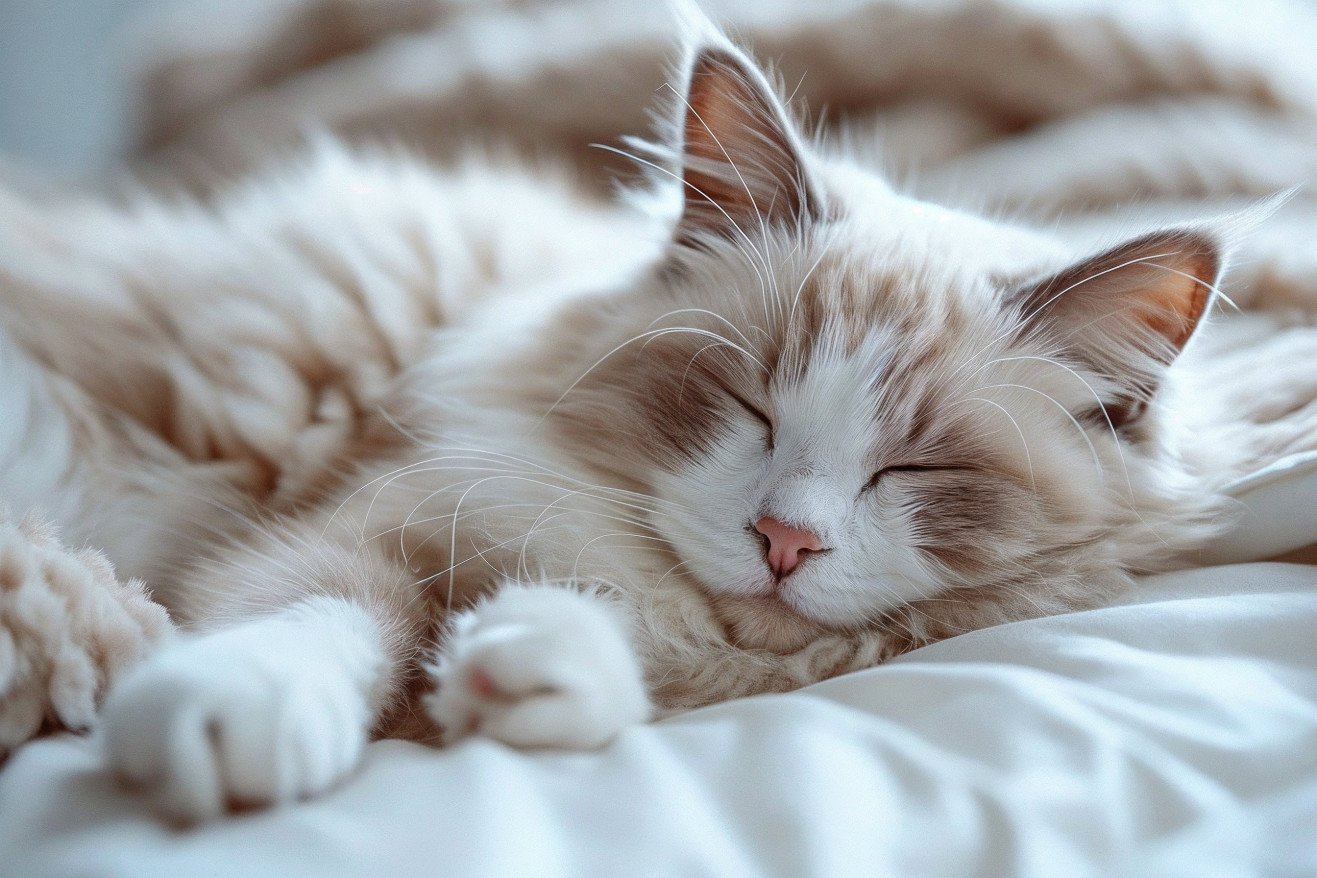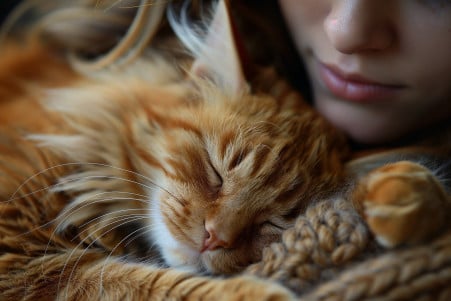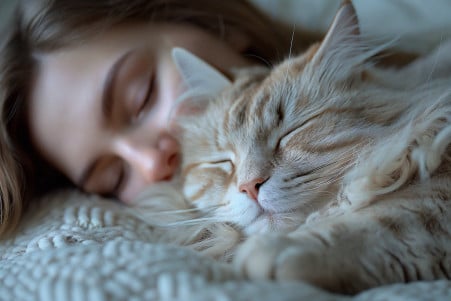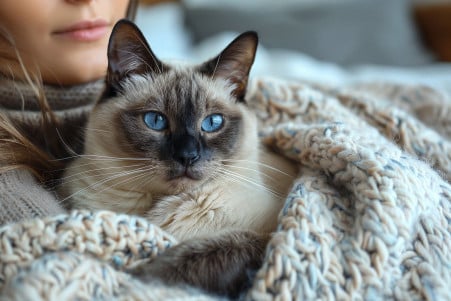Why Does My Cat Sleep on My Pillow? Experts Explain
25 April 2024 • Updated 25 April 2024

If you’re a cat owner, you’ve probably walked into your bedroom to find your cat sleeping on your pillow. But why do cats do this? It turns out that cats sleep for up to 16 hours a day and prefer to sleep in high places that smell like their owners, so your pillow is the perfect place for them to catch some z’s.
To better understand why cats sleep on your pillow, we’ll look at the findings of veterinary scientists and animal behaviorists. This will help us learn more about cats’ natural instincts and sleeping patterns, and give us some insight into the psychology of cats and why they do this. From the need for security to the need for intimacy, this look at the science will help you understand your cat’s sleeping habits better.
Why does my cat sleep on my pillow?
The Science Behind Cats' Sleeping Habits and Preferences
Cats are crepuscular, meaning they are most active at dawn and dusk, which has an impact on their sleeping habits and need for frequent naps. As a result, cats sleep up to two-thirds of their lives, and they take many short catnaps throughout the day to save up energy for hunting. This is a behavior that goes back to their wild ancestors, who needed to rest between hunting sessions.
Sleeping in elevated spots like pillows helps house cats feel safe and allows them to keep an eye on their environment, which is a holdover from their wild ancestors' need to find a safe place to rest. In addition, cats like to sleep on warm, soft surfaces, and they may be drawn to pillows because they are soft and smell like their owners.
According to the Cornell University's Feline Health Center, older cats or cats with medical issues may be especially drawn to their owner's pillows because they are looking for a warm, comfortable place to rest that will also provide them with a sense of security. This is an example of a deeply ingrained sleeping preference that shows how evolutionary traits have continued to influence the habits and preferences of our house cats.
Why Do Cats Knead Pillows and Blankets?
Kneading, or 'making biscuits,' is a natural behavior that cats retain from kittenhood when they knead their mother's belly to stimulate milk flow, according to Purina UK. In adulthood, cats may knead soft items like pillows and blankets to help them relax and release hormones like oxytocin.
Kneading also helps cats mark their territory by leaving the scent of pheromones from the sweat glands in their paw pads on the item, reports PetMD. Female cats may knead more often when they're in heat, and the kneading behavior may help them attract a mate in the wild, according to Scientific American. In pet cats, kneading their owners' pillows may be a way to bond with them and stake a claim to them as part of their territory.
How to Train Your Cat to Not Sleep on Your Pillow
While many people love having their cats sleep with them, others may want to train their cats to sleep elsewhere due to concerns about cleanliness or the quality of their own sleep. According to 9 Quick and Easy Tips for Getting Your Cat to Sleep in Its Own Bed, one way to do this is to make sure your cat has a comfortable, elevated bed near your bed that they can use as an alternative to your pillow. The article also recommends using positive reinforcement, such as giving your cat treats when they sleep in their bed instead of on your pillow.
In addition, TheCatSite suggests that you can train your cat to sleep elsewhere by gradually changing their schedule to include more play and exercise before bed so that they're more tired and less active at night. If all else fails, you can always close your bedroom door to keep your cat out if they continue to sleep on your pillow despite your best efforts to train them.
Finally, the Pets Stack Exchange suggests that you can use deterrents such as double-sided tape or aluminum foil on your pillow to make it less appealing to your cat. With a little patience and positive reinforcement, you can help your cat learn to sleep somewhere else while still maintaining a positive relationship.
The Physical Benefits of Sleeping with Your Cat
For the pet owner, letting your cat sleep in your bed can offer a sense of comfort, safety, and companionship. PD Insurance notes that the difference in body temperature between humans and cats can make for a better night's sleep, as cats are drawn to the warmest place in the room. The purring of a cat is a constant, rhythmic sound that operates between 20 and 30 vibrations per second, and it has been shown to reduce stress and blood pressure. In fact, studies on the healing properties of a cat's purr have shown that these purr frequencies match the vibrational/electrical frequencies used to treat a variety of painful conditions.
Moreover, a 10-year study conducted by the University of Minnesota's Stroke Institute showed that cat owners had a 30% lower risk of death from heart attack than non-cat owners. The scientists said that this was due to the stress and anxiety-reducing benefits of cat ownership. That said, the CDC has noted that outdoor cats can carry diseases, so people with compromised immune systems should check with their healthcare provider before sharing a bed with their pet.
Conclusion: Understanding and Accepting Your Cat's Sleeping Habits
Cats' sleeping habits are based on their need for warmth, security, and bonding with their human. Cats sleep up to 16 hours a day and prefer to sleep in high places and on items that smell like their owners, which is why your pillow is so appealing to your furry friend.
Sleeping on your pillow also allows your cat to mark you with their scent and bond with you through scent exchange. Kneading, or 'making biscuits,' is an instinctual behavior that can help cats relax and release hormones like oxytocin. For pet cats, kneading their owner's pillow can be a way to mark their territory and ensure their owner is part of their territory as well.
While some people may want to discourage their cats from sleeping on their pillows, others may want to encourage the behavior due to the potential health benefits. Sleeping with your cat can help you both feel more comfortable, secure, and bonded. In addition, research has shown that the vibrations from a cat's purr can reduce stress and even improve the heart health of their human companions.
That said, outdoor cats can potentially transmit diseases, so people with compromised immune systems should talk to their doctor before sharing a bed with their cat. By understanding and accepting your cat's natural sleeping habits, you can ensure that you both get a good night's sleep.


